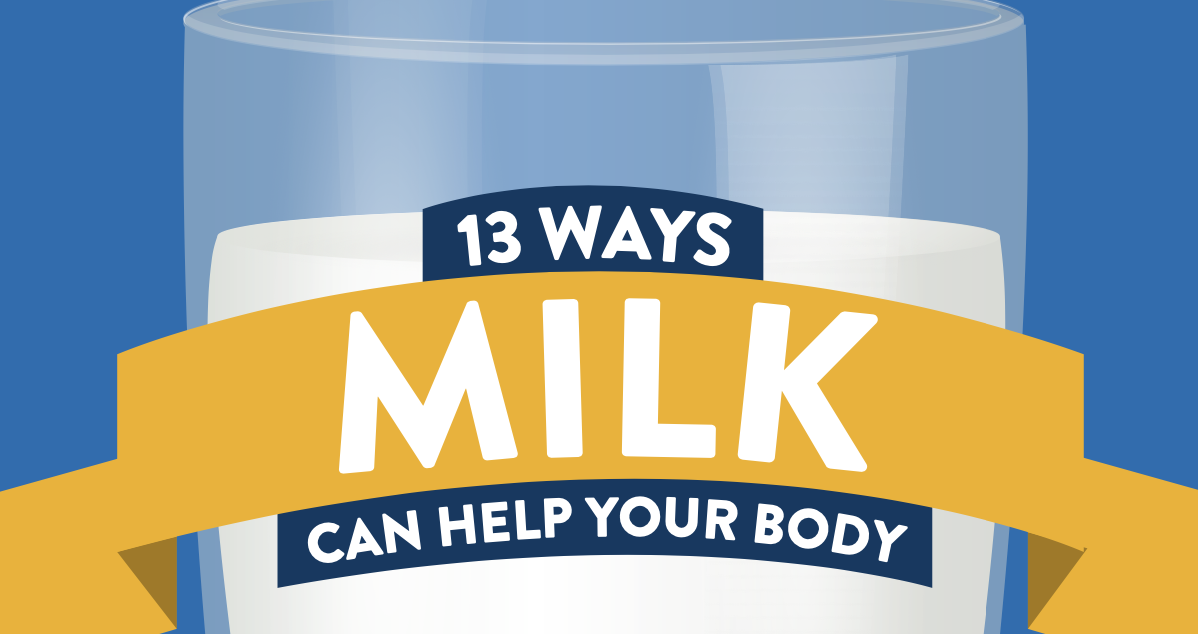Nutrition Benefits
Fuel your LifeWhat’s in a glass?
Real milk has only three ingredients and delivers a powerful package of thirteen essential nutrients at only about 26 cents per 8 ounce serving. Naturally nutrient-rich like no other beverage, you might even say milk is Nature’s Wellness Drink.
As a food lover and dietitian, I’m always looking for that amazing balance between health and taste. Dairy really can help get you there because it provides you not only great nutrition but also great taste, texture, and satisfaction.
A Closer Look Inside Dairy’s Health Benefits
Dietary Guidelines for Americans recommend three servings of low-fat or fat-free milk or milk products every day. What do milk’s nutrients do to keep your body healthy? Click on the infographic above, or read on to find out.
Calcium
25% Daily Value
Calcium helps build and maintain strong bones and teeth. It also plays an important role in nerve function, muscle contraction and blood clotting.
Phosphorus
20% Daily Value
Phosphorus helps strengthen bones and generates energy in the body’s cells.
Vitamin B12
50% Daily Value
Vitamin B12 helps build red blood cells that carry oxygen from the lungs to working muscles.
Zinc
10% Daily Value
Zinc helps maintain a healthy immune system, helps support normal growth and development and helps maintain healthy skin.
Protein
16% Daily Value
Protein builds and repairs muscle tissue and serves as a source of energy during high-powered endurance exercise.
Vitamin A
15% Daily Value
Vitamin A helps maintain normal vision and skin, helps regulate cell growth and maintains the integrity of the immune system.
Pantothenic Acid
20% Daily Value
Pantothenic acid helps your body use carbohydrates, fats and protein for fuel.
Selenium
10% Daily Value
Selenium helps maintain a healthy immune system, helps regulate metabolism, and helps protect healthy cells from damage.
Potassium*
10% Daily Reference Intake
Potassium regulates the body’s fluid balance, helps maintain normal blood pressure and is needed for muscle activity and contraction.
Vitamin D
15% Daily Value
Vitamin D helps promote the absorption of calcium and enhances bone mineralization.
Riboflavin
30% Daily Value
Riboflavin, also known as vitamin B2, helps convert food into energy – a process crucial for exercising muscles.
Niacin
15% Daily Value
Niacin (or niacin equivalent) is important for the normal function of many enzymes in the body and is involved in the metabolism of sugars and fatty acids.
Iodine
60% Daily Value
Iodine is necessary for proper bone and brain development during pregnancy and infancy; linked to cognitive function in childhood.
The % Daily Value (DV) tells you how much a nutrient in a serving of food contributes to a daily diet. 2,000 calories a day is used for general nutrition advice.
*Source: USDA FoodData Central. FDA’s Daily Value (DV) for potassium of 4700 mg is based on a 2005 DRI recommendation. In 2019, NASEM updated the DRI to 3400 mg. Based on the 2019 DRI, a serving of milk provides 10% of the DRI. FDA rule-making is needed to update this value for the purpose of food labeling.

Real Milk vs. Plant Based Alternatives
Taste, nutrition and cost are at the top of the list when considering food and beverage options. To help better understand a few of your choices when comparing real milk to milk alternatives, we have provided this handy infographic
Something for Everybody
Learn how dairy supports health and wellness at every age.
Kids
Growing bodies require vital nutrients, especially calcium, vitamin D and potassium, to develop strong bones and muscles. Including dairy as part of a healthy diet ensures kids and teens are getting the nutrition they need, while also offering variety and great taste.
Adults
Emerging scientific research is revealing that dairy food consumption is associated with several health benefits including reduced risk of cardiovascular disease and Type 2 diabetes,and lower blood pressure.
Athletes
In addition to training, incorporating good nutrition to fuel, hydrate and refuel your body can elevate your athletic performance. Consisting of over 85 percent water, plus carbohydrates, protein and eight additional essential nutrients, milk is an excellent choice for muscle recovery and hydration.
Seniors
To minimize the progressive loss of muscle that occurs with aging, consuming high-quality protein from sources such as whey protein isolate, along with resistance training, helps maintain muscle mass in older adults. And to keep bones strong and reduce the risk of osteoporosis, you can’t beat the calcium dairy provides.
Award Winning, Age-Specific Nutrition Education Resources
The Dairy Council® of Arizona and Nevada provide free nutrition education materials throughout the states of Arizona and Nevada. Visit the catalog to browse and order.



